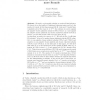Free Online Productivity Tools
i2Speak
i2Symbol
i2OCR
iTex2Img
iWeb2Print
iWeb2Shot
i2Type
iPdf2Split
iPdf2Merge
i2Bopomofo
i2Arabic
i2Style
i2Image
i2PDF
iLatex2Rtf
Sci2ools
98
Voted
CRYPTO
2004
Springer
2004
Springer
Security of Random Feistel Schemes with 5 or More Rounds
We study cryptographic attacks on random Feistel schemes. We denote by m the number of plaintext/ciphertext pairs, and by k the number of rounds. In their famous paper [3], M. Luby and C. Rackoff have completely solved the cases m 2n/2 : the schemes are secure against all adaptive chosen plaintext attacks (CPA-2) when k ≥ 3 and against all adaptive chosen plaintext and chosen ciphertext attacks (CPCA-2) when k ≥ 4 (for this second result a proof is given in [9]). In this paper we study the cases m 2n . We will use the “coefficients H technique” of proof to analyze known plaintext attacks (KPA), adaptive or non-adaptive chosen plaitext attacks (CPA-1 and CPA-2) and adaptive or non-adaptive chosen plaitext and chosen ciphertext attacks (CPCA-1 and CPCA-2). In the first part of this paper, we will show that when m 2n the schemes are secure against all KPA when k ≥ 4, against all CPA-2 when k ≥ 5 and against all CPCA-2 attacks when k ≥ 6. This solves an open problem of [1],...
Related Content
| Added | 01 Jul 2010 |
| Updated | 01 Jul 2010 |
| Type | Conference |
| Year | 2004 |
| Where | CRYPTO |
| Authors | Jacques Patarin |
Comments (0)

